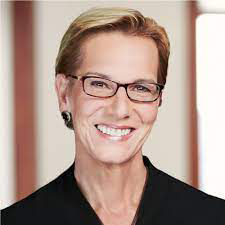Q&A with Academy Board Member Katherine B. Forrest

Katherine B. Forrest is a Partner at Paul, Weiss, Rifkind, Wharton & Garrison LLP and also a member of the Board of Governors for The New York Academy of Sciences. With an extensive background in law, government and social sciences, she brings unique insight to the Board. We interviewed her to learn more about her background, why she chose to get involved with the Academy, and why she’s passionate about artificial intelligence.
*some quotes have been edited for length and clarity
What does being a member of the Academy’s Board mean to you?
In 2023, I became a member of the Academy’s Board. It’s an extraordinary honor, as someone who has spent my professional life in areas that are considered to be essentially non-scientific. I was trained as a lawyer. I became a judge for a period of time and a government official. But my interests have tended towards technology, and particularly artificial intelligence (AI) and ethics.
Understanding that The New York Academy of Sciences had a broad enough tent to be able to take that in as part of its overall interest in terms of what it wanted represented on the Board of Governors was thrilling to me. For me, it’s one of my crowning achievements to be able to have an organization like The New York Academy of Sciences recognize the work that I have done by virtue of reaching out and suggesting that I have something to contribute to the Board of Governors.
When did you first become interested in the Academy’s work?
I became aware of the work of The New York Academy of Sciences through a number of people that I ran into in the field of AI, working with a variety of researchers where my work overlapped. I also felt like it was not something that many of my social science colleagues necessarily knew about. I became interested in the Academy’s work around 2007 or 2008 when the Internet was hot and heavy and there was a lot of work being done on Internet issues in the digital transformation.
The Academy was involved in a variety of conferences relating to that. And then, of course, my dear friend, David Mordecai is on the Board of Governors. We teach a class together at NYU Law School on quantitative methods, and so he was the one who actually introduced me to the Board of Governors.
How does your personal or professional background inform your commitment to the Academy?
My professional background today is focused on artificial intelligence strategic and advisory work for a broad array of clients. What I am passionate about is staying on top of the technology, and what I try to bring to my clients is not just a newsletter with legal or strategic advice, but an understanding of the technology, in particular, how some of the technological advances in AI can raise ethical issues, compliance issues, governance issues, strategic concerns, and things of that nature.
What I like to do is to have my personal work, which is now oriented towards science, but also with the law in there, which informs what I do every day. My commitment is to bring to the Board of Governors a different perspective. The kind of perspective of someone who is both a lawyer but working in the AI area and able to bring science and law together in a way that can hopefully be of help to the Board.
Is there one Academy program or initiative that gets you the most jazzed up?
It’s the umbrella of different kinds of AI initiatives that are occurring at the Academy that really gets me jazzed up. I think the Academy has an awful lot to offer in terms of speakers that we bring in. Yann LaCun presented about a week or so ago. We have all kinds of young thinkers and researchers whose work we support through programs, events, and other efforts related to AI.
New York City is the hub of some real research. It’s not just in Silicon Valley. In particular, downtown Manhattan is a hot spot for AI research. I think the Academy can lead the way when discussing and advancing the very complicated ethical issues that we’re going to be confronting in the years to come.
Is there anything else you’d like to add?
One of the extraordinary things about the Academy, and being on the Board of Governors, is to see the array of talent both through our leadership at the Academy itself, and on the Board of Governors. It’s incredible to see the number of highly accomplished individuals in science or science-adjacent areas, like the social sciences, who bring a lot of these issues that we’re working on to the forefront. The Academy has an unparalleled array of talent, and I am just very honored to be able to be a part of that.